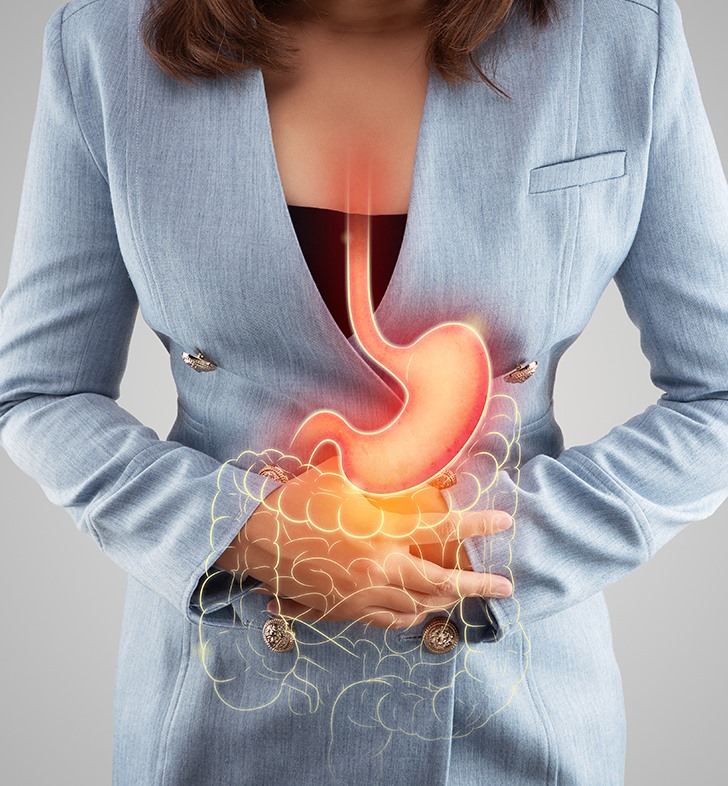
Atrophic Gastritis
What are atrophic gastritis and autoimmune atrophic gastritis? Atrophic gastritis (AG) is a chronic inflammation and thinning of your stomach lining. In addition, the cells in your stomach lining mimic intestinal cells. One type of atrophic gastritis, known as environmental metaplastic atrophic gastritis (EMAG), occurs when environmental factors cause chronic inflammation. Chronic infection with H. pylori (Helicobacter pylori) bacteria often leads to this condition. These bacteria disrupt the mucus that usually protects your stomach lining from acidic juices released during digestion. Over many years, this acid destroys the cells in your stomach lining, causing EMAG. Autoimmune atrophic gastritis (AAG) is the second type of atrophic gastritis. It occurs when your immune system attacks your stomach lining cells. Healthcare providers may also call this condition autoimmune gastritis (AIG) or autoimmune metaplastic atrophic gastritis (AMAG). Both EMAG and AAG can lead to an increased risk of developing small neuroendocrine tumors (NETs) in your stomach. NETs are usually non-cancerous (benign). EMAG and AAG also increase your stomach cancer (gastric cancer) risk.
Who might get environmental atrophic gastritis? You’re at higher risk of environmental atrophic gastritis if you: Are Asian or Hispanic. Are older than age 70. Eat a high-salt diet. Have an H. pylori infection. Live in crowded conditions. Smoke.
Who might get autoimmune atrophic gastritis (AAG)? You’re at higher risk of autoimmune atrophic gastritis if you: Were assigned female at birth (AFAB). Are African American or of northern European descent. Have a family history of AAG. Have a genetic mutation. Have other autoimmune diseases, including Addison disease, autoimmune thyroid disease (such as Hashimoto disease or Graves disease), Type 1 diabetes or vitiligo.
How common are environmental
metaplastic atrophic gastritis (EMAG) and autoimmune atrophic gastritis (AAG)?
An estimated 15% of people in the
U.S. have AG. About 0.5% to 2% of the U.S. population may have AAG.
What causes environmental
metaplastic atrophic gastritis?
H. pylori infection usually causes
EMAG. People most often become infected with this bacteria during childhood.
Causes of the infection include direct contact with contaminated:
Feces (poop).
Food.
Saliva.
Vomit.
Water.
What causes autoimmune atrophic
gastritis?
Antibodies are proteins that are
part of your immune system and help fight bacterial and viral infections. In
AAG, antibodies attack your healthy stomach cells.
Your antibodies may also attack a
protein released by your stomach cells (intrinsic factor). Intrinsic factor
usually helps to absorb vitamin B12. Without intrinsic factor, your body may
not be able to make healthy red blood cells. This can lead to pernicious
anemia. A lack of vitamin B12 may also cause nerve damage (neuropathy).
What are the signs and symptoms of
environmental atrophic gastritis?
You can have atrophic gastritis and
not have any signs or symptoms. When H. pylori causes atrophic gastritis, signs
and symptoms may include:
Upper abdominal pain.
Iron-deficiency anemia.
Loss of appetite.
Nausea and vomiting.
Peptic ulcers.
Unexplained weight loss.
What are the symptoms of autoimmune
atrophic gastritis?
You can have autoimmune atrophic
gastritis and not have any signs or symptoms. If AAG causes a vitamin B-12
deficiency, you may have symptoms of anemia and nerve damage. These symptoms
include:
Chest pain.
Dizziness, lightheadedness and
weakness.
Heart palpitations.
Mental confusion (delirium).
Nausea and vomiting.
Pale skin.
Rapid pulse.
Ringing in your ears (tinnitus).
Tingling and numbness in your limbs.
How are these conditions diagnosed?
Your healthcare provider will first
ask about your symptoms and do a physical exam. They will gently press down on
your stomach to check for tenderness.
If your provider suspects atrophic
gastritis or autoimmune atrophic gastritis, they may suggest blood tests to
check your levels of:
Healthy red blood cells (a lack of
healthy red blood cells can cause anemia).
Iron.
Antibodies.
Gastrin, a hormone that promotes
stomach acid production.
Pepsinogen, a protein made by your
stomach cells.
Vitamin B12.
Your provider may also perform an
upper endoscopy, where they:
Insert a thin instrument with a
light on the end (endoscope) down your throat and into your stomach.
Take a sample of tissue (biopsy) to
test for signs of atrophic gastritis and the H. pylori bacterium.
Look for the presence of small
neuroendocrine tumors (NETs).
How are they treated?
Your provider may treat
environmental metaplastic atrophic gastritis with:
Antibiotics to treat H. pylori
infection.
Medications to reduce your stomach
acid.
Routine endoscopic monitoring.
Your provider may treat autoimmune
atrophic gastritis with:
B12 injections to raise your vitamin
levels.
Iron infusions.
If an endoscopy shows the presence
of small neuroendocrine tumors, your provider can remove them during the
procedure (endoscopic mucosal resection). These tumors are usually
non-cancerous (benign). Your provider will monitor you for these tumors every
one to two years.